
Jefferson Airplane was an American rock band formed in San Francisco, California, in 1965. One of the pioneering bands of psychedelic rock, the group defined the San Francisco Sound and was the first from the Bay Area to achieve international commercial success. They headlined the Monterey Pop Festival (1967), Woodstock (1969), Altamont Free Concert (1969), and the first Isle of Wight Festival (1968) in England. Their 1967 breakout album Surrealistic Pillow was one of the most significant recordings of the Summer of Love. Two songs from that album, "Somebody to Love" and "White Rabbit", are among Rolling Stone's "500 Greatest Songs of All Time".

Jefferson Starship is an American rock band from San Francisco, California, formed in 1974 by a group of musicians including former members of Jefferson Airplane. Between 1974 and 1984, they released eight gold or platinum-selling studio albums, and one gold-selling compilation. The album Red Octopus went double-platinum, reaching No. 1 on the Billboard 200 chart in 1975. The band went through several major changes in personnel and genres through the years while retaining the Jefferson Starship name. The band name was retired in 1984, but it was picked up again in 1992 by a revival of the group led by Paul Kantner, which has continued since his death in 2016.

Surrealistic Pillow is the second studio album by the American rock band Jefferson Airplane, released on February 1, 1967, by RCA Victor. It is the first album by the band with vocalist Grace Slick and drummer Spencer Dryden. The album peaked at number three on the Billboard 200 and has been certified platinum by the Recording Industry Association of America (RIAA). It is considered to be one of the most influential and quintessential works of the early psychedelic rock era and 1960s counterculture.

"Somebody to Love" is a rock song that was written by Darby Slick. It was originally recorded by the Great Society, and later by Jefferson Airplane. Rolling Stone magazine ranked Jefferson Airplane's version No. 274 on their list of the 500 Greatest Songs of All Time.

John William Casady is an American bass guitarist, best known as a member of Jefferson Airplane and Hot Tuna. Jefferson Airplane became the first successful exponent of the San Francisco Sound. Singles including "Somebody to Love" and "White Rabbit" charted in 1967 and 1968. Casady, along with the other members of Jefferson Airplane, was inducted into the Rock and Roll Hall of Fame in 1996.
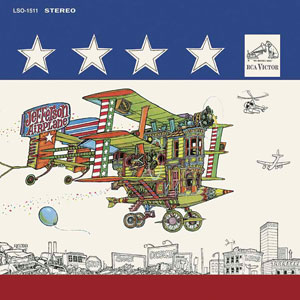
After Bathing at Baxter's is the third studio album by the San Francisco psychedelic rock band Jefferson Airplane, released in 1967 as RCA Victor LSO-1511 (stereo) and LOP-1511 (mono). The cover art is by artist Ron Cobb.
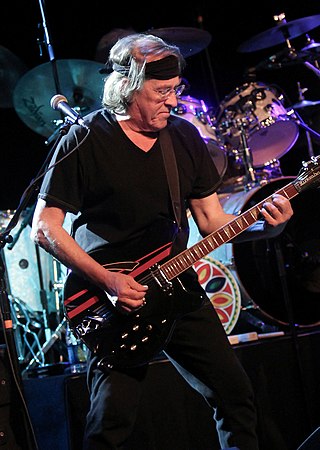
Paul Lorin Kantner was an American rock musician. He is best known as the co-founder, rhythm guitarist, and a secondary vocalist of Jefferson Airplane, a leading psychedelic rock band of the counterculture era. He continued these roles as a member of Jefferson Starship, Jefferson Airplane's successor band.

Crown of Creation is the fourth studio album by the San Francisco psychedelic rock band Jefferson Airplane, released by RCA Victor in August 1968. The album saw the band continuing their development of psychedelic music, emphasizing acid rock with science fiction themes.

"White Rabbit" is a song written by Grace Slick and recorded by the American rock band Jefferson Airplane for their 1967 album Surrealistic Pillow. It draws on imagery from Lewis Carroll's 1865 book Alice's Adventures in Wonderland and its 1871 sequel Through the Looking-Glass.

Bless Its Pointed Little Head is a live album by Jefferson Airplane recorded at both the Fillmore East and West in the fall of 1968 and released in 1969 as RCA Victor LSP-4133. The album reached #17 on the Billboard Top LP's chart in March 1969.
"Wooden Ships" is a song written and composed by David Crosby, Paul Kantner, and Stephen Stills and recorded both by Crosby, Stills & Nash and by Kantner with Jefferson Airplane. It was written and composed in 1968 in Fort Lauderdale, Florida, on a boat named Mayan, owned by Crosby, who composed the music, while Kantner and Stills wrote most of the lyrics.

The Worst of Jefferson Airplane is the first compilation album from the rock band Jefferson Airplane, released in November 1970 as RCA Victor LSP-4459. The "Worst" in the title is ironic, as the album features all of Jefferson Airplane's hit singles up to that point. It peaked at #12 on the Billboard 200 in 1971 and has since gone platinum.
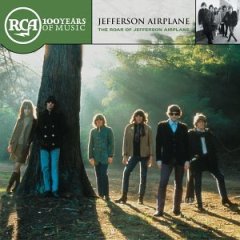
The Roar of Jefferson Airplane is a compilation of songs by San Francisco rock band Jefferson Airplane without the ubiquitous "White Rabbit". "The Ballad of You and Me and Pooneil" is followed immediately by "The House at Pooneil Corners", thus making a suite from the two similar and related songs originally released on separate albums.

Jefferson Airplane Loves You is a three-CD boxed set of recordings by the San Francisco rock band Jefferson Airplane with extensive liner notes by Jeff Tamarkin, author of the Jefferson Airplane history Got a Revolution: The Turbulent Flight of Jefferson Airplane.

The Essential Jefferson Airplane is a compilation of music from San Francisco rock band Jefferson Airplane spanning its entire career, excluding the brief reunion in 1989.
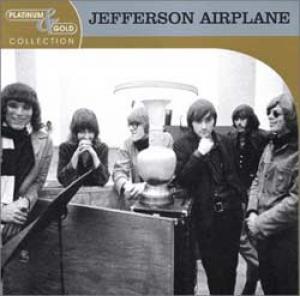
The Platinum & Gold Collection is part of Arista Records' Platinum & Gold Collection. Recorded between 1966 & 1969, this compilation serves as a primer for both the early years of Jefferson Airplane and the golden age of psychedelic rock. The songs were variously produced by Matthew Katz, Tommy Olive, Rick Jarrad, Al Schmitt, and Paul Kantner.

At the Family Dog Ballroom is a recording of a 1969 performance by the San Francisco rock band Jefferson Airplane at the Family Dog Ballroom in San Francisco. Released on CD in the United Kingdom, the album is a digipak offering of material only recently rediscovered. A poster is included.
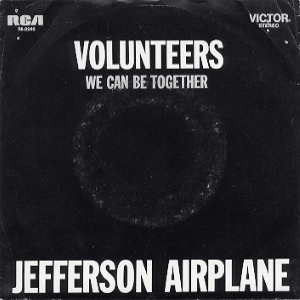
"Volunteers" is a Jefferson Airplane single from 1969 that was released to promote the album Volunteers two months before the album's release. It was written by Marty Balin and Paul Kantner. Balin was woken up by a truck one morning, which happened to be a truck with Volunteers of America painted on the side. Balin started writing lyrics down and then asked Kantner to help him with the music. The music is similar to that of the single's b-side "We Can Be Together" and was based on a bluegrass riff that David Crosby had shown Kantner. "Volunteers" also has a similar chord structure and rhythm to "We Can Be Together".

Live at the Monterey Festival is a live album by the San Francisco rock band Jefferson Airplane, which was released in the United Kingdom and Europe by Thunderbolt Records in 1991. The album was authorized by the band and features the entire set from the group's June 17, 1967, performance at the Monterey Pop Festival. The album marked the first time that Jefferson Airplane's entire Monterey Pop Festival performance had been given a release by a legitimate record company.
"The House at Pooneil Corners" is a song by the American rock group Jefferson Airplane and written mainly by singer Marty Balin that first appeared as the 11th and final track on the band's 1968 album Crown of Creation. It also appeared on the compilation album The Roar of Jefferson Airplane along with the similarly named song "The Ballad of You and Me and Pooneil".


















